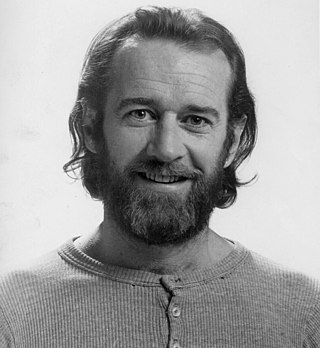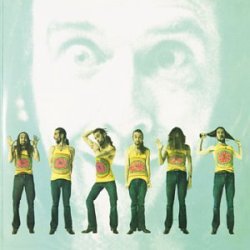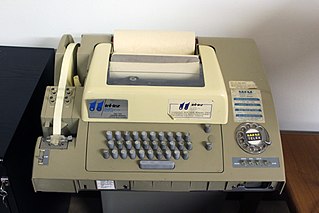
Morse code is a telecommunications method which encodes text characters as standardized sequences of two different signal durations, called dots and dashes, or dits and dahs. Morse code is named after Samuel Morse, one of the early developers of the system adopted for electrical telegraphy.

Motherfucker, sometimes abbreviated as mofo, mf, or mf'er, is an English-language vulgarism. It is a form of the profanity fuck. The word is usually considered highly offensive. However, in common usage, it is rarely used to refer to one person having intercourse with a woman who is a mother. Rather, the word usually refers to a mean, despicable, or vicious person; or any particularly difficult or frustrating situation. Conversely, it can be used positively, as a term of admiration, as in the term badass motherfucker (BAMF), meaning a fearless and confident person.

George Denis Patrick Carlin was an American stand-up comedian, social critic, actor, and author. Regarded as one of the most important and influential comedians of all time, he was dubbed "the dean of counterculture comedians". He was known for his dark comedy and reflections on politics, the English language, psychology, religion and taboo subjects.

The seven dirty words are seven English-language curse words that American comedian George Carlin first listed in his 1972 "Seven Words You Can Never Say on Television" monologue. The words, in the order Carlin listed them, are: "shit", "piss", "fuck", "cunt", "cocksucker", "motherfucker", and "tits".
Federal Communications Commission v. Pacifica Foundation, 438 U.S. 726 (1978), was a landmark decision of the United States Supreme Court that upheld the ability of the Federal Communications Commission (FCC) to regulate indecent content sent over the broadcast airwaves.

The "Stand By Your Ad" provision (SBYA) of the Bipartisan Campaign Reform Act, enacted in 2002, requires candidates in the United States for federal political office, as well as interest groups and political parties supporting or opposing a candidate, to include in political advertisements on television and radio "a statement by the candidate that identifies the candidate and states that the candidate has approved the communication". The provision was intended to force political candidates running any campaign for office in the United States to associate themselves with their television and radio advertising, thereby discouraging them from making controversial claims or attack ads.

Dirty Jobs is an American television series that originally aired on the Discovery Channel in which host Mike Rowe is shown performing difficult, strange, disgusting, or messy occupational duties alongside the job's current employees. The show, produced by Pilgrim Films & Television, premiered with three pilot episodes in November 2003. It returned as a series on July 26, 2005, running for eight seasons until September 12, 2012. The show's setting was refocused in Australia for the final season, called Dirty Jobs Down Under. A spinoff miniseries titled Dirty Jobs: Rowe'd Trip premiered on July 7, 2020. The original series returned on January 2, 2022 for two more seasons, concluding on February 2, 2023.

Class Clown is the fourth album released by American comedian George Carlin. It was recorded on May 27, 1972 at the Santa Monica Civic Auditorium in Santa Monica, California, and released in September.

Rusty trombone is a sexual act in which a man stands with his knees and back slightly torqued with feet at least shoulder width apart to expose his anus. A person typically kneels behind the man and performs anilingus while reaching up beneath the scrotum or around the body to manually administer rapid back-and-forth motions of the penis, mimicking the motions of a trombone player. The act is defined primarily by the physical orientation of the partners, the combination of anilingus with manual sexual stimulation and the resemblance of the anal sphincter to a trombone mouthpiece; however, other positions and variations are possible.

Occupation: Foole is the fifth album released by American comedian George Carlin. It was recorded on March 2 and 3, 1973 at the Circle Star Theater in San Carlos, California, and released in October of that year. The album was later included as part of the 1992 Classic Gold collection, and The Little David Years (1971-1977) box set in 1999.

KMNY is a commercial AM radio station licensed to Hurst, Texas, and serving the Dallas Fort Worth Metroplex. It is owned by Multicultural Broadcasting and broadcasts a Spanish-language Christian radio format known as "La Voz 1360." KMNY uses a brokered programming approach, where preachers buy blocks of time on the station and can ask for donations during their shows to support their ministries.
George Carlin: Again! is American comedian George Carlin's second HBO stand-up television special. It was filmed in the round at The Celebrity Theatre in Phoenix, Arizona on July 23, 1978.
KCLB-FM is a commercial radio station in Coachella, California, broadcasting to the Palm Springs, California, radio market. It airs a mainstream rock radio format. KCLB is owned by Alpha Media LLC, through licensee Alpha Media Licensee LLC Debtor in Possession. Programming is simulcast on sister station 95.5 KCLZ in Twentynine Palms Base, about 30 miles to the north of Coachella.
Carlin at Carnegie is George Carlin's third special to be seen on HBO, recorded at Carnegie Hall, New York City in 1982, released in 1983. Most of the material comes from A Place for My Stuff, his ninth album released earlier that same year. Unlike the first two, this special was edited down to an hour and routines from the same show like "A Place for My Stuff" and "Baseball and Football" do not appear in this special. The performance of "Seven Dirty Words," his last recorded performance of the routine, features Carlin's updated list of inappropriate words.
Paul R. Frommer is an American communications professor at the University of Southern California (USC) and a linguistics consultant. He is the former Vice President, Special Projects Coordinator, Strategic Planner, and Writer-Researcher at Bentley Industries in Los Angeles, California. From 2005 to 2008, he served as Director of the Center for Management Communication at the USC Marshall School of Business.
ARGUS, an acronym for Automatic Routine Generating and Updating System, was an Assembly Language devised in the late 1950s by Honeywell for their Honeywell 800 and 1800 computers.

Telex is a telecommunication service that provides text-based message exchange over the circuits of the public switched telephone network or by private lines. The technology operates on switched station-to-station basis with teleprinter devices at the receiving and sending locations. Telex was a major method of sending text messages electronically between businesses in the post–World War II period. Its usage went into decline as the fax machine grew in popularity in the 1980s.

Between 1990 and 2004, the Federal Communications Commission (FCC) issued fines totaling $2.5 million to radio licensees for airing material it deemed indecent from The Howard Stern Show, the highest amount of any American radio show. The Supreme Court had provided broadcasting guidelines for indecent material in its 1978 ruling in its landmark decision, in which the court prohibited the "seven dirty words" made famous by comedian George Carlin. The FCC had received complaints about Howard Stern as early as 1981, but its limited power at the time prevented further action taking place.

The Data Intercept Technology Unit is a unit of the Federal Bureau of Investigation (FBI) of the United States, which is responsible for intercepting telephone calls and e-mail messages of terrorists and foreign intelligence targets inside the US. It is not known when DITU was established, but the unit already existed in 1997.
Actionable indecency is a legal doctrine held by the Federal Communications Commission since the 1978 FCC vs. Pacifica case, that broadcast speech can be regulated even if it does not contain the seven dirty words deemed "indecent".












